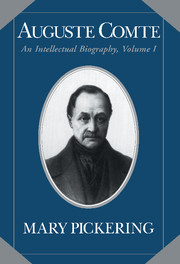Book contents
- Frontmatter
- Contents
- Acknowledgments
- Abbreviations
- Introduction
- 1 The Early Years
- 2 The Life and Works of Saint-Simon up to 1817
- 3 Comte's First Works for Saint-Simon
- 4 Comte's Growing Independence, 1819–1821
- 5 The Fundamental Opuscule and Comte's Rupture with Saint-Simon
- 6 The Aftermath of the Rupture: The Search for Connections
- 7 Comte's Efforts to Establish Himself
- 8 Intellectual and Mental Crises
- 9 The Road to Recovery, 1828–1830
- 10 Years of Success and Confrontation, 1830–1838
- 11 Comte's Changing Psyche and Aberrant Behavior, 1838–1840
- 12 The Encounter between Two Luminaries: Comte and Mill
- 13 1842: A Turning Point
- 14 Cours de philosophie positive: Positivism and the Natural Sciences
- 15 Cours de philosophie positive: Sociology
- Conclusion
- Bibliography
- Index
13 - 1842: A Turning Point
Published online by Cambridge University Press: 06 January 2010
- Frontmatter
- Contents
- Acknowledgments
- Abbreviations
- Introduction
- 1 The Early Years
- 2 The Life and Works of Saint-Simon up to 1817
- 3 Comte's First Works for Saint-Simon
- 4 Comte's Growing Independence, 1819–1821
- 5 The Fundamental Opuscule and Comte's Rupture with Saint-Simon
- 6 The Aftermath of the Rupture: The Search for Connections
- 7 Comte's Efforts to Establish Himself
- 8 Intellectual and Mental Crises
- 9 The Road to Recovery, 1828–1830
- 10 Years of Success and Confrontation, 1830–1838
- 11 Comte's Changing Psyche and Aberrant Behavior, 1838–1840
- 12 The Encounter between Two Luminaries: Comte and Mill
- 13 1842: A Turning Point
- 14 Cours de philosophie positive: Positivism and the Natural Sciences
- 15 Cours de philosophie positive: Sociology
- Conclusion
- Bibliography
- Index
Summary
The preface … will make my friends afraid without making my enemies laugh.
Comte, 1842PRAISES AND ATTACKS
Other Englishmen from Mill's circle began to pay homage to Comte in 1842. When the Grotes came to Paris to attend the reception of their friend Alexis de Tocqueville at the Académie Française, Mrs. Grote found time to pay Comte a visit, informing him that many English statesmen had read his works with “pleasure” and “instruction.” Sir William Molesworth, the founder of the London Review and an important leader of the Philosophic Radicals, thought so well of the Cours that he was reading it for the third time. In 1842 Marrast put Comte in contact with another admirer, George Lewes, who was also a young friend of Mill. Though disappointed that Lewes was “still imperfectly cured of the psychological illness,” Comte would later become enchanted with him.
While enjoying praises from England, Comte faced growing troubles at home. In spite of having expressed pleasure at the success of the reactionary movement, he found himself suddenly under attack by a Catholic journal. This incident, according to Comte, followed an unfortunate set of events. On January 16, 1842, he had awakened early to write the conclusion of lesson 57 of his Cours, in which he claimed to have “laid the foundations of truly stable new convictions.”
- Type
- Chapter
- Information
- Auguste ComteAn Intellectual Biography, pp. 539 - 560Publisher: Cambridge University PressPrint publication year: 1993



